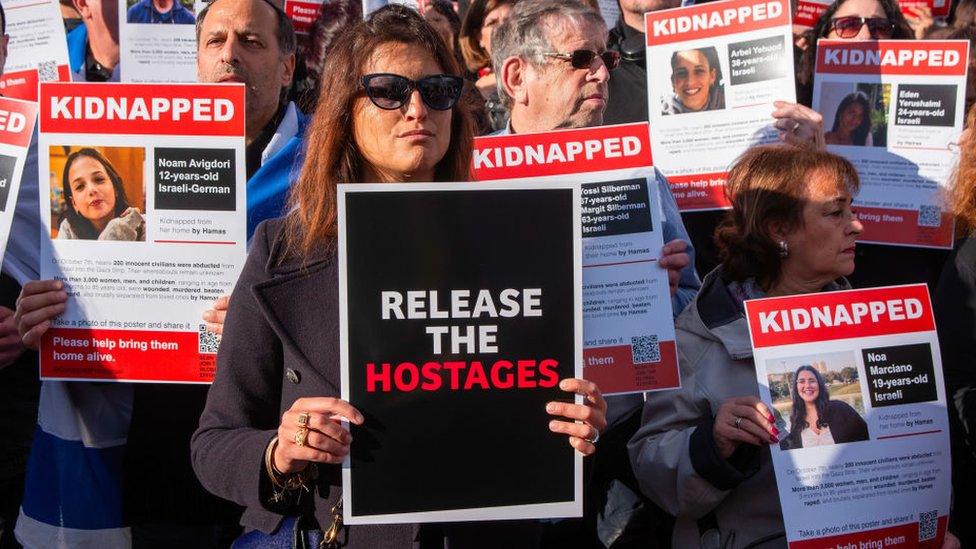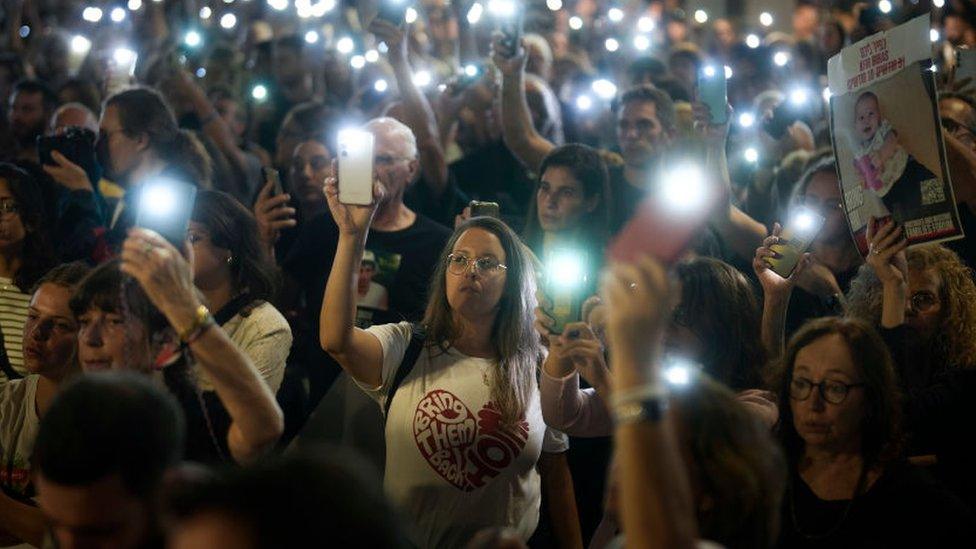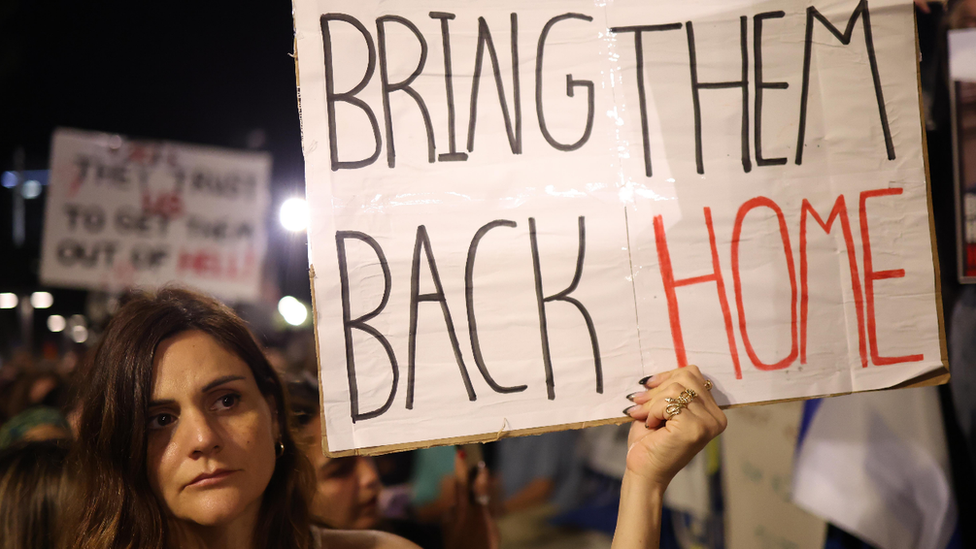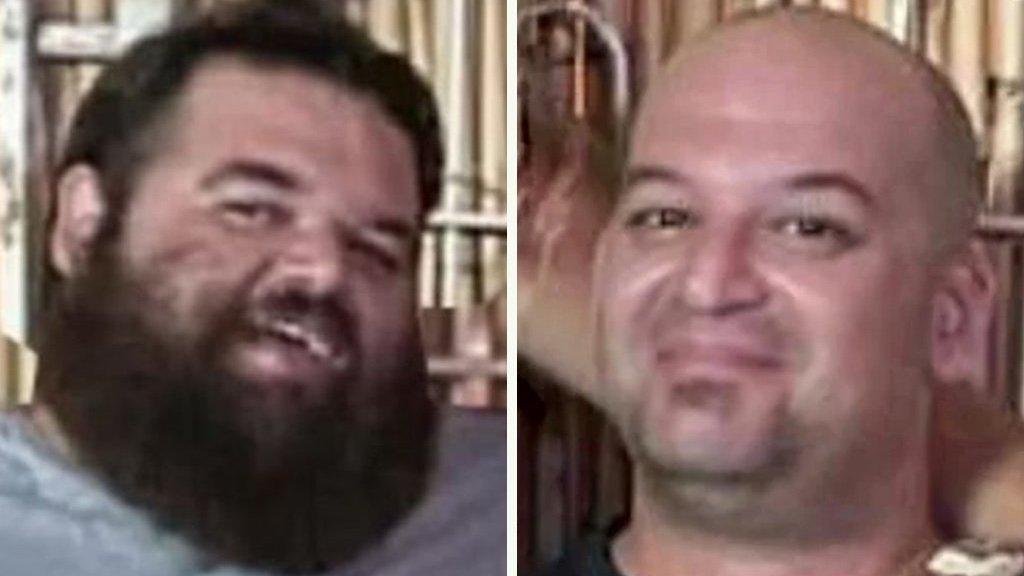Israel hopeful of Hamas deal to release hostages in 'coming days'
- Published

Protesters have gathered in cities around the world calling for the release of hostages taken by Hamas
The Israeli ambassador to the US says he is hopeful a deal for the release of a significant number of hostages will be reached "in the coming days".
Michael Herzog told ABC "serious efforts" were being made, but that the fewer details he revealed, "the better the chances of such a deal".
Hamas took an estimated 240 people hostage during their 7 October attacks which killed 1,200 Israelis.
Qatar, which has been mediating, also says a deal is within reach.
The Washington Post newspaper has reported that Israel and Hamas are "close to agreement on a US-brokered deal that would free dozens of women and children held hostage in Gaza in exchange for a five-day pause in fighting", citing "people familiar with the emerging terms".
Qatar's Prime Minister Mohammed Bin Abdulrahman al-Thani said on Sunday that only "very minor" practical and logistical obstacles remain, adding that "we are close enough to reach a deal".
The US has not confirmed any details of progress.
White House National Security Council spokeswoman Adrienne Watson posted on X: "We have not reached a deal yet, but we continue to work hard to get to a deal."
And Israeli PM Benjamin Netanyahu has ruled out a full ceasefire.
Qatar has been playing a leading role in mediation efforts to secure the release of hostages being held by Hamas in Gaza.
It was involved in the negotiations that have seen four people freed so far - a mother and daughter, who are US nationals, and two elderly Israeli women.
The small, gas-rich Arab Gulf state is home to the political leadership of Hamas, which has had an office in the capital, Doha, since 2012, headed by its leader Ismail Haniyeh.
On Saturday, protesters calling on the Israeli government to prioritise securing the release of hostages walked from Tel Aviv to Jerusalem before holding a demonstration outside Mr Netanyahu's residence.
Mr Netanyahu has been criticised for not doing more to free those held by Hamas.
In a press conference on Saturday night, he said the first goal of the war was to destroy Hamas, the second was to return the hostages and the third was to eliminate the threat from Gaza.

Thousands have joined hostages' families putting pressure on the Israeli government
"We want answers," said protester Ari Levi, who had two family members - including his 12-year-old son - taken by Hamas from kibbutz Nir Oz on 7 October.
"It's not normal to have children kidnapped for 43 days. We don't know what the government is doing, we don't have any information," Mr Levi told the AFP news agency.
"I want the government to bring them home to us," said Dvora Cohen, 43, whose brother-in-law and 12-year-old nephew are both believed to be held by Hamas.
This week Israel's military said it had found the bodies of two hostages - 65-year-old Yehudit Weiss and 19-year-old soldier Noa Marciano - in the Gaza Strip.
Israel has launched a massive retaliatory operation - involving air and artillery strikes as well as ground troops - with the aim of eliminating Hamas.
The Hamas-run health ministry says the death toll in Gaza since then has reached 12,300. More than 2,000 more are feared to be buried under rubble.

More on Israel-Gaza war
Follow live: Latest updates
Gaza Strip mapped: Life in Gaza under siege
Reporting: Assessing video Israel released of tunnel and hostages
Explained: The faces of hostages taken from Israel
History behind the story: The Israel-Palestinian conflict

- Published15 November 2023

- Published27 February
